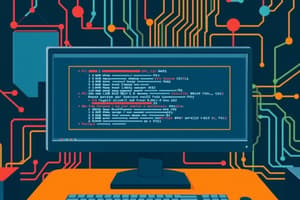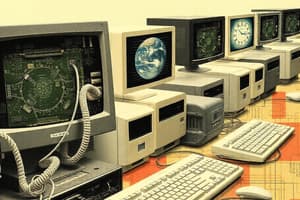Podcast
Questions and Answers
What is the name of the first electronic digital computer developed in 1936?
What is the name of the first electronic digital computer developed in 1936?
Konrad Zuse's computer
What does computer hardware refer to?
What does computer hardware refer to?
Physical components of a computer system
What is the function of the processor in a computer system?
What is the function of the processor in a computer system?
Executing instructions and performing calculations
What are the examples of input/output devices mentioned in the text?
What are the examples of input/output devices mentioned in the text?
What is computer software?
What is computer software?
What is the importance of computer literacy in today's digital age?
What is the importance of computer literacy in today's digital age?
What do operating systems like Windows, macOS, and Linux do?
What do operating systems like Windows, macOS, and Linux do?
What are applications or software programs?
What are applications or software programs?
What abilities does computer literacy encompass, besides technical skills?
What abilities does computer literacy encompass, besides technical skills?
Why is it crucial for individuals to stay informed and adapt to technological changes?
Why is it crucial for individuals to stay informed and adapt to technological changes?
Flashcards are hidden until you start studying
Study Notes
Introduction to Computers
Computers have become an integral part of our lives, shaping the way we work, communicate, and entertain ourselves. In this article, we will explore the history of computers, their hardware and software components, and the importance of computer literacy.
History of Computers
The history of computers can be traced back to the 14th century when early calculating devices were created. However, the first electronic digital computer was developed in 1936 by Konrad Zuse in Germany. The first computer, known as the Electronic Numerical Integrator and Computer (ENIAC), was developed in the United States during World War II. Since then, computers have evolved significantly, from large mainframe computers to small, portable devices like smartphones and laptops.
Computer Hardware
Computer hardware refers to the physical components of a computer system, such as the processor, memory, storage, input/output devices, and peripherals. These components work together to process, store, and transmit data. The processor, also known as the central processing unit (CPU), is the brain of the computer, executing instructions and performing calculations. Memory, or random access memory (RAM), temporarily stores data for the CPU to access quickly. Storage devices, such as hard disk drives and solid-state drives, provide long-term data storage. Input/output devices, like keyboards, mice, and displays, allow users to interact with the computer and receive feedback.
Computer Software
Computer software refers to the programs, applications, and operating systems that run on computer hardware. Software allows users to perform specific tasks, such as word processing, web browsing, and gaming. Operating systems, like Windows, macOS, and Linux, manage the computer's hardware and software resources and provide a user interface for interacting with the computer. Applications, or software programs, perform specific tasks, such as web browsing, video editing, and gaming.
Importance of Computer Literacy
Computer literacy is the ability to use computers and digital technology effectively. It is essential in today's digital age, as it enables individuals to access and utilize information, communicate with others, and participate in the digital economy. Computer literacy is not limited to technical skills but also encompasses critical thinking, problem-solving, and collaboration abilities. By becoming computer literate, individuals can improve their productivity, enhance their career opportunities, and engage in the digital world.
In conclusion, computers have come a long way since their inception and have become an essential tool in our daily lives. Understanding the history of computers, their hardware and software components, and the importance of computer literacy helps us appreciate the impact they have on our lives and society as a whole. As technology continues to advance, it is crucial for individuals to stay informed and adapt to these changes to remain competitive in the digital world.
Studying That Suits You
Use AI to generate personalized quizzes and flashcards to suit your learning preferences.




